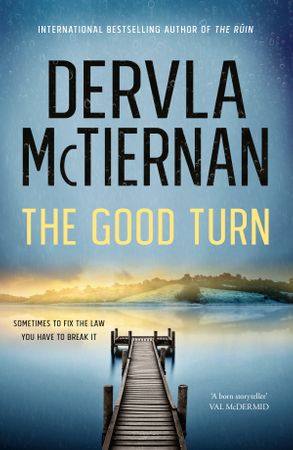Author: Dervla McTiernan
Publisher/Year: HarperCollins/2020
Review first published in The Sydney Morning Herald on 6 March 2020 and reproduced with permission.
Reviewer: Sue Turnbull
Perth-based writer Dervla McTiernan usually opens her police procedurals with an intriguing scenario designed to capture the attention of her readers. Each of her three crime novels set in Galway featuring Detective Cormac Reilly has begun with a memorable vignette involving a young woman in a harrowing situation. Just how this predicament might relate to the main plot is a card McTiernan keeps up her sleeve to play later.
In The Ruin, Cormac is summoned to a dilapidated mansion in the dead of night to be confronted with an undernourished 15-year-old and an emaciated woman dead in bed of an apparent heroin overdose. In The Scholar, after learning of her father’s death in an avalanche, a teenager visits her wealthy grandfather in his house on the hill for a gothic encounter that Alfred Hitchcock would have relished.
In The Good Turn, a young mother sits with her small daughter in an ugly and neglected doctor’s waiting room, surrounded by jittery addicts awaiting methadone treatment. Her daughter has stopped speaking, and while the teachers at school want to know why, her mother is desperate to avoid the inevitable domestic scrutiny that the search for a diagnosis will entail.
True to form, this is a vividly realised scene that appears completely unrelated to the action that follows, although it will be revealed as axiomatic. Knowing this is McTiernan’s strategy is part of the pleasure of reading The Good Turn, which is the most accomplished book thus far in a series that has already won its fair share of accolades, including Davitt, Ned Kelly and ABIA awards.
What makes it such a compelling read has a lot to do with how it is structured and the pace with which McTiernan spools out a tricky plot while managing a cast of diverting characters. Following the brief opening scene, we are once again introduced to Cormac’s off-sider, Peter Fisher, whose eagerly anticipated day off is interrupted by the reported abduction of a little girl as observed by an 11-year-old boy at home with bronchitis. Sick as the observant lad may be, he has had the nous to capture the scene on his tablet computer. McTiernan understands how children operate.
As the situation rapidly escalates, it becomes abundantly clear that Cormac’s boss, Superintendent Brian Murphy, is unwilling to divert resources to support Cormac’s team. Murphy, and his equally objectional son, Trevor, have much bigger fish to fry. There’s a major drug bust in the offing, and the fate of a child hardly registers in the overall scheme of their ambition.
Eighty-one fraught pages later, Peter and Cormac are in trouble. Peter has shot their main suspect, and Cormac is suspended pending an investigation into his handling of the case. Murphy is clearly determined that both will pay, and Cormac’s fury at the injustice of it all is palpable.
The action shifts to Connemara and the village of Roundstone, to which Peter has been sent as a punishment. His dissolute father, Des, is the local sergeant, and his beloved grandmother, Maggie, lives in a stone dormer cottage on a hill. Cormac, meanwhile, will head off to Brussels where his partner, Emma, is working as a scientist in a bid to keep their relationship afloat. It’s been in danger of sinking for some time now.
While Peter might resent being sidelined to what amounts to a desk job, there’s a lot going on in Roundstone, not least his fraught dealings with his difficult father, who treats the village as his fiefdom. To add to the domestic complications, his grandmother is seriously ill. Meanwhile, Cormac starts a clandestine investigation of his own into the operations of Murphy’s drug task force. There is, it must be said, never a dull moment.
As the scale of the corruption that Peter and Cormac are now facing becomes increasingly apparent, the stakes get even higher. By the end. I was not just thoroughly invested in their struggle for justice, but also cheering them on.
Rest assured, while The Good Turn may be gripping, it is also uplifting – and there aren’t many crime novels you can say that about. McTiernan has absolutely hit her stride.
